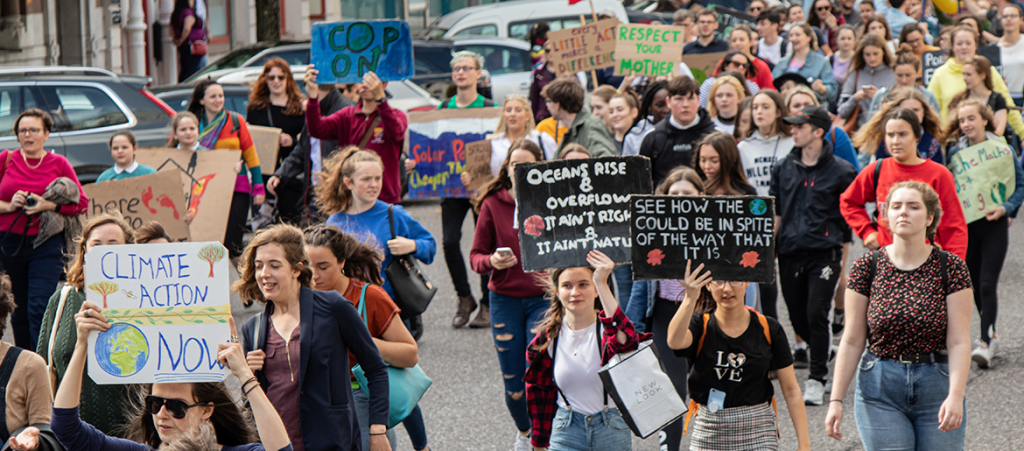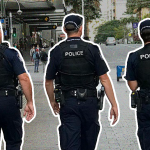
Black Lives Matter, Roe v Wade and the world literally being on fire has inspired growing numbers of people to take to the streets in protest, including here in Australia. But what if I told you that the way you protest could actually land you in jail (which happened in late June 2022 to Blockade Australia protestors)? If you are planning to attend a protest for any cause, you’ll need to know the laws to make your voice can be heard safely and so you can protect others in attendance.
Here’s a brief rundown on the protest laws for each state. While these regulations on protest can definitely be used by the authorities to restrict organisers (for example, by waiting until the last minute to reject a permit) and the laws essential coming down to the interpretation of police officers in attendance… you’re still better off knowing, than not.
Jump to: VIC, NSW, QLD, WA, SA, TAS, ACT, NT
Victoria
Although peaceful protesting is a right in Victoria, protesters can be charged with obstruction, trespass, unlawful assembly, offensive behaviour, besetting, assault, resist or hinder police, riot or affray. Property-related offences include property damage as well as burglary.
New laws have recently been introduced specific to protests at Victorian logging sites. Under the incoming law, the maximum jail sentence and fines for hindering, obstructing or interfering with timber harvesting operations is now 12 months and more than $21,000. Officers are now also authorised to search containers, bags and vehicles as well as issue banning notices to repeat offenders. PVC and metal pipes will also be added to the prohibited items list.
New South Wales
This year New South Wales has passed laws that can see people fined up to $22,000 or imprisoned for two years if they protest on public roads, rail lines, tunnels, bridges or industrial estates. Basically if a protest “seriously disrupts or obstructs vehicles or pedestrians” it’s a no-go. The laws were introduced as a response to a series of climate protests, during which activists blockaded the Port of Botany and major roads including the Spit Bridge near Manly. Groups such as the Human Rights Law Centre, Aboriginal Legal Service, NSW Council for Civil Liberties and the Environmental Defenders Office have all come out in opposition to the laws.
While the right to peacefully and lawfully protest is technically still protected, the new laws don’t leave many options of where and how to hold these protests – it leaves the door open for police to rule almost any protest gathering as an obstruction.
Queensland
Under Queensland’s Peaceful Assembly Act 1992, you have the right to peaceful protest in a public place. This is as long as you’re protecting public safety, maintaining public order and protecting others’ rights and freedoms – basically not screaming in people’s faces and letting them carry on with their business. According to the act you don’t need authorisation from the police to hold a public assembly, but forgoing this increases the risk of hostile police interactions. For example, an unauthorised public assembly could result in a charge of obstruction: one traffic rule is that pedestrians must not cause a traffic hazard or unreasonably obstruct the path of any driver or other pedestrian – if police thinks a protestor is breaking that rule, they can be fined up to 20 penalty units (currently $2669).
Queensland has introduced laws that ban people using ‘locking devices‘, which rules out actions like gluing yourself to the ground or locking yourself to a tree. It also covers anything that can block industrial sites, roads or buildings. These laws criminalise parts of peaceful protest, despite the fact that the UN said the move was at odds with international human rights obligations.
Western Australia
In WA protests can be deemed illegal if police deem protestors to be trespassing (including staying in a place after being asked to leave), intending to cause harm, or causing a traffic hazard or obstruction. In these cases, protesters can face up to two year jail terms or fines up to $25,000. Most commonly, though police officers will ask you to leave a public place if they suspect you are: breaching the peace, hindering, obstructing or preventing any lawful activity from being carrier out, intending to commit an offence, have just committed or are committing an offence. A move on notice is not a criminal charge, but you can be arrested for breaching a move on notice.
South Australia
In South Australia, protest actions must meet the requirements of the Public Assemblies Act 1972. This legislation states approval is required before public assembly from the Commissioner of Police, Chief Secretary or local council in the area where the assembly is proposed. If approved, a protester can participate in the assembly without being charged with criminal or civil offences so long as he or she behaves in accordance with the conditions of the approval.
Protesters participating in an approved public assembly cannot be charged with any offences connected with obstructing traffic if that is the intended effect of the pre-approved assembly route. If a protest blocking traffic is not authorised, police may arrest participants.
Tasmania
The freedom to protest in Tasmania is under threat. There is a bill currently before parliament that means someone marching on the street towards parliament house could be jailed for up to three months. The bill aims to expand criminal offences relating to protest activity.
Under the proposed bill, if a community member marching on the streets protesting climate change happens to block vehicles or pedestrians, they could be deemed to have caused unreasonable obstruction. They could be jailed for three months or fined up to $1730.
Fines for organisations are also set to rise dramatically — a body corporate that obstructs a business will face a fine of up to $103,800. Here’s an example: if an underpaid hospitality worker attends their workplace to demand entitlements, they could be deemed as obstructing the business in the process. They could be fined up to $8,650 or be served a jail term up to 12 months. If that offence is found to have caused “a serious risk” to the safety of themselves or someone else, the maximum penalties increase to $12,975 in fines or up to 18 months in jail. If it’s their second offence, the maximum fine increases to $21,625 or up to two-and-a-half years in jail.
The majority of Tasmania’s upper house members voted in favour of the bill. The Legislative Council still has to vote on a third reading of the bill and a majority of members are almost certain to pass it. After that the amended legislation has to pass the lower house again before it becomes law, but that’s basically guaranteed as the government has a majority. We will update this article as the situation progresses.
Australian Capital Territory
Peaceful protest and demonstration is protected in ACT and you do not require formal approval to conduct a protest or demonstration. The only condition is that protests in parliamentary zones and diplomatic areas do require permission first. You also need approval to put up a structure as part of your protest, including anything that is built (like a sun shelter), a fire (including if you burn a flag, sign or effigy) or any element fixed to the ground. The ACT government does warn participants to observe lawful directions issued by Parliamentary Security Service, Australian Federal Police Uniform Protection officers or the Australian Federal Police. Failure to do so may result in arrest – and rough treatment, as the Tomorrow Movement protesters found out.
Northern Territory
In the Northern Territory you need a permit to protest in a public place, but there aren’t other laws regulating protests specifically. The normal laws about orderly public conduct still apply, including being charged with offensive conduct if you “cause substantial annoyance to another person.”




Comments are closed.